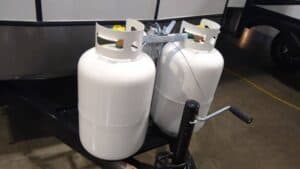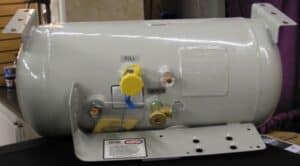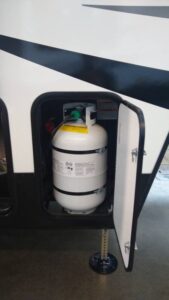I probably look like Buddy the Elf cautiously turning a Jack in the Box every time I change my propane tanks without gloves.
Many years ago, I got a blast of propane on my hand while changing a tank on a forklift. As I jerked my hand back it felt severely burned, and I feared the worst. Did I really need all five fingers to open the pickle jar anyway?
Thankfully, my hand was back to normal within a few minutes. My heart slowed down three hours later. It serves as a great reminder for me to respect the dangers of propane.
Oh, and wear gloves!
RV, Meet Propane.

In an RV, we use propane as fuel for our stoves, furnaces, water heaters, and absorption refrigerators.
Propane is an affordable and plentiful* energy source derived from natural gas. It has exceptional energy density. One pound of propane contains roughly 21,500 BTUs of energy!
Almost all RVs use propane. Many appliances, such as water heaters and 3-way refrigerators are dual-source, meaning they can run off either electricity or propane.
Propane has remained popular for several decades because it allows boondockers to run critical appliances while camping off-grid. Until recently, with the advent of affordable solar panels, bigger batteries and cheap inverter generators, propane was the only name in the game for long-term off-grid camping.
The propane system on your RV is easy to find.
- Towables often use one or two portable DOT-approved gas bottles located either on the A-frame tongue or underneath the fifth-wheel overhang.
- Motorhomes, and some luxury towables, often use permanently mounted ASME-approved gas bottles located in the basement of the chassis.
A two-stage regulator reduces the high-pressure liquid propane in the storage tank to low-pressure propane gas. A piping system, made from flexible hoses or metal pipe, distributes the propane to all connected appliances.
Understanding propane safety requirements is critical. There are many misconceptions about propane, and incorrect assumptions will put you, your family, and the entire campground in danger.
*If only we would stop needlessly and wastefully burning the valuable stuff as “flaring,” but that’s a rant for another time …
The Dangers of Propane
1. Yes, Propane Is Combustible and Flammable
Propane is a combustible and flammable gas. When it burns, it reaches more than 3,500 degrees Fahrenheit!
And yes, propane can go boom.
On July 6, 2021, a 100-lb propane tank exploded during a house fire in West Michigan. The family had escaped barely 5 minutes earlier. A mom, wearing just a T-shirt and underwear, had rushed outside carrying her 15-month-old baby.
As a firefighter approached the house, the tank exploded, sending up a fireball that could be seen for miles. Most of the house was instantly leveled. Firefighters searched for the propane tank afterward, saying it could have flown more than half a mile due to the force of the explosion.
Skip to 2:30 to witness the propane tank explosion.
Propane is combustible at a fairly low limit of flammability. Its range is 2.15 to 9.6, which means that between 2.15 and 9.6% of the total propane/air mixture must be propane for combustion.
Anywhere within that range, and a single spark or arc can ignite an explosion. And because propane is heavier than air, you can’t smell it until it’s already way too dangerous.
RV propane tanks are equipped with valves to reduce the likelihood of an explosion. The theory is that a raging fireball is better than a massive explosion, especially if an RV is confined with the narrow back-in site of an RV park.
And despite what we see in the movies, the propane tanks we are carrying in our RVs are incredibly durable. Mythbusters disproved 007’s ability to take out a gang of bad guys with a single bullet and a propane tank. They fired everything they could at full propane tanks and failed to make one explode. I feel safer knowing it took a demolition expert to finally make one explode (Unless I ever get on the bad side of a demolition expert).
However, sometimes, things go wrong. Here’s a sobering video of an RV propane tank explosion that instantly destroyed the RV and severely damaged all the surrounding campers.
2. Propane Can Suffocate You
Propane is non-toxic at low and medium concentrations. Generally, it has no ill effects with skin or eye contact. However, high concentrations (above 10,000 PPM) may cause dizziness.
No long term exposure health risks associated with LP gas or propane have been reported at low concentrations.
Fun fact: The main ingredient in most aerosol dry shampoos is propane. Don’t light a match near your perm!
However, propane is an asphyxiating gas. If inhaled into the lungs, propane can lead to oxygen deprivation. Symptoms include:
- Nausea
- Dizziness
- Headaches
- Cough
- Elevated pulse/irregular heartbeart
In severe cases, propane asphyxiation can lead to heart failure, loss of consciousness, and death.
Propane should only ever be used in ventilated areas, preferably outdoors. No sources of electrical arcs or ignition sources should be in the vicinity. All metal equipment should be grounded. For more information on safely handling propane, see this page from the Canadian Centre for Occupational Health and Safety.
Call 911 or Poison Control if you or someone else requires assistance because of suspected propane poisoning.
3. Propane Can Cause Frostbite
Liquid propane is extremely cold. Like, make-the-South-Pole-feel-like-the-tropics cold.
Propane has a boiling point of -44 degrees Fahrenheit. This is why liquid propane is stored at such high pressure. Otherwise, it would instantly vaporize into a gas!
Unfortunately, that means when liquid propane is depressurized by being released into the atmosphere, it absorbs a tremendous amount of energy. In other words, it’s freakishly cold.
Liquid propane can cause cold burns, blistering, and extreme frostbite. Sustained exposure, meaning anything much more than a second, can turn your skin solid as glass and cause permanent tissue damage.
In my case, I had a very brief blast hit my hand and only suffered mild skin irritation. But again, prolonged exposure could lead to frostbite!
Follow Your Nose

Having worked with propane most of my career, I’m familiar with the distinct smell associated with the gas. It has been compared to rotten eggs or a skunk.
Propane manufacturers add a compound, called mercaptan, to the otherwise odorless gas to help quickly identify a leak. It is a safety measure.
Should you smell propane, follow these 4 steps.
- Extinguish anything that could possibly ignite the propane
- Leave the area
- Shut off the propane
- Report the propane leak if needed
I’ve smelled propane several times in our RV, and every time it was from someone bumping the stove knob allowing it to release a small amount of gas. We’ve also had our propane alarm triggered by curious kids and clumsy adults.
Because propane is heavier than air, it will sink to the bottom of your RV. So if you can smell the propane, you’re already in the danger zone. You need to open both your windows, turn on a ceiling fan to blow downwards, and open your front door if possible! Heavy propane will be able to flow out your front door due to the force of gravity.
If you smell propane and cannot identify the source, you need to immediately depart your RV and turn off the main shutoff valve on your propane tanks.
RV Propane Detector/Alarm
Because propane is heavier than air, propane will pool at the floor level far from your nostrils. Unless you are 5’4” like me. Short guy wins!
If you are running propane in your rig, you must have a RV propane detector/alarm. An RV Propane Detector or RV Propane alarm is a wall-mounted device used to detect propane leaks.
Many of these detectors are combination LP/CO2 safety devices. They should be connected to a 12V power circuit, always on.
MTI industries appears to be the leader in the RV propane detection space. They provide specific instructions on the placement of these devices to ensure their effectiveness. They cannot be blocked, cannot be installed right next to exterior door or window, and should be placed between 4 and 20 inches from the lowest ground level of the RV.
Wear Safety Gear

The Occupational Safety and Health Administration (OSHA) recommends avoiding skin contact (put your gloves on) and wearing safety glasses.
Even after getting blasted on my hand by propane, I find myself fighting the urge to take shortcuts and not wear gloves. But like a responsible adult, I put safety first!
Know How to Turn Your RV Propane Off
This may seem obvious, but I’ll go over it anyway. First you need to know where your propane tanks are located. Most valves have arrows pointing Open/Close. To turn off the propane, you simply close the valve. If there are multiple propane tanks, you will need to close both valves.
Devices like “Gas Stop” can be attached to your propane tanks for leak detection. If a leak is detected, you guessed it, the device shuts off your propane.
Taking Care of Your RV Propane System
To keep your RV propane system in tip top shape, it’s recommended to:
- Have your propane system inspected by a professional on an annual basis.
- Make sure all exterior vents are clear of anything that may restrict ventilation.
- Perform a visual inspection of your own propane system, i.e. checking for damaged tanks, frayed or cracked hoses or leaks.
- Inspect the mounting brackets to ensure tanks are secure.
Understanding Your RV Propane Tanks
Two Types of RV Propane Tanks
American Society of Mechanical Engineers (ASME)

- Location: Permantly Installed in RV
- Most Commonly Found In: Classic A, B & C
- Refilling: Vehicle must be driven to filling station
- Capacity: Up to 100lb depending on RV size
- Care: Does not require recertification
Department of Transportation (DOT)

- Location: Removable from RV
- Most Commonly Found In: Travel trailers, fifth wheels, towables
- Refilling: Removable tanks can be exchanged or filled without the RV
- Capacity: 2 x 20lb (typical), 30 & 40
- Care: Must be re-certified
How Should You Store Your RV Propane Tanks?
The location for propane storage is determined by the manufacturer, leaving little flexibility for modification. As RV owners we do have an influence on the conditions we subject our propane tanks to.
It is recommended by AmeriGas that you:
- Do not subject your tanks to temperatures below -40F or above 120F
- Do not store your tank in direct sunlight, on its side or upside down
- Do not store your tank inside your home or vehicle
- Turn your propane tanks off when not in use
Should You Turn Your Propane Off When Traveling?
The debate about having propane off or on while driving is almost as highly contested as tire PSI.
The main benefit of leaving propane on during travel is to keep your refrigerator running. This really isn’t necessary as your sealed fridge should keep your food cold for up to 24 hours.
If you have ever driven in the Hampton Roads, Virginia area you are familiar with three fairly large tunnels that go under the water. You are required to shut your propane off prior to going into any of these tunnels.
Since propane is heavy, there is potential for propane from open tanks pooling in the middle of the tunnel. This would create an explosion hazard. Similar rules exist at many other transportation tunnels.
I’m already puckered up driving through the tunnel because of the size of my rig! And now I have to worry about driving through a propane cloud in the bottom of the tunnel. (AHHH!)
Since we don’t travel too far between destinations (150-250) miles, we just keep the propane off. I’ve seen too many ’90s action movies to risk it. Sylvester Stallone’s “Daylight” taught me one wrong move can make an entire tunnel explode for over 2 minutes. I don’t want to be that guy.
Here are some better solutions to keeping your fridge cold while in transit:
- Use ice packs or dry ice.
- Turn on your fridge at least 12 hours before traveling.
- If your tow vehicle and trailer are properly setup, you can run a 2-way or 3-way fridge off your tow vehicle alternator on DC power.
Refilling Tanks
If the attendant at the propane filling station has a cigarette hanging out of their mouth, you may want to try another location. When transporting your removable propane tanks to a filling station, I suggest that you:
- Never store a propane tank in a hot vehicle
- Keep your tank upright and secure while driving
- Keep your tank in a well-ventilated area
- Don’t take your propane tank sightseeing. Get your tank filled and head back to camp.
- Close your propane valve
Propane is considered safe, efficient, and even green when compared to other fossil fuels. It is essential for our full-time way of life.
Plus, anything that can keep my beer cold and my Blackstone griddle hot is OK in my book.

Michael Huff: Full-time RVer, husband, father, son, brother, friend and dreamer. I am officially “living the dream:” traveling the country with my amazing wife, four awesome kids, and beloved boxer in our 150-sf RV. Each day we are learning, laughing, (maybe a little yelling) and finding the good in this world.
Leave a Reply